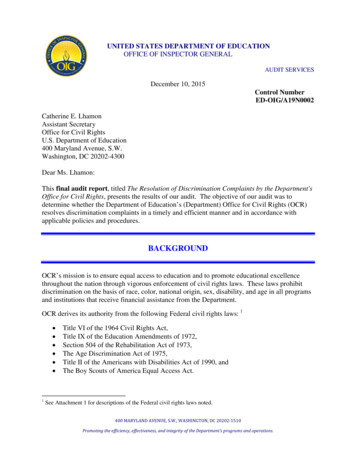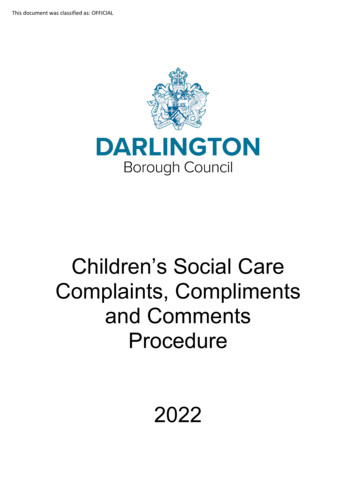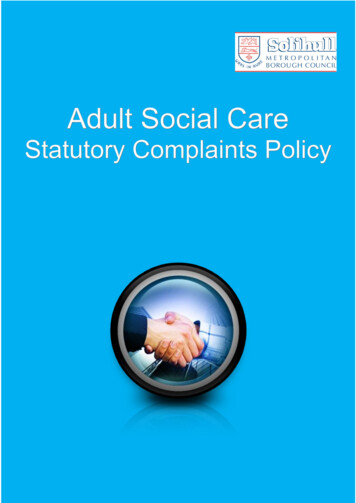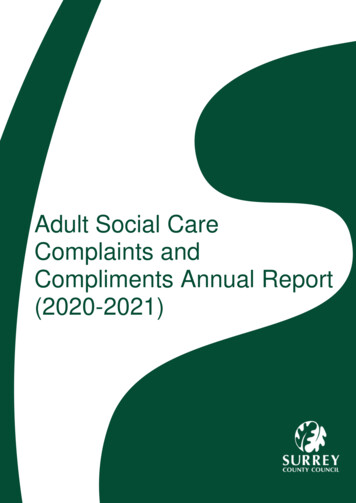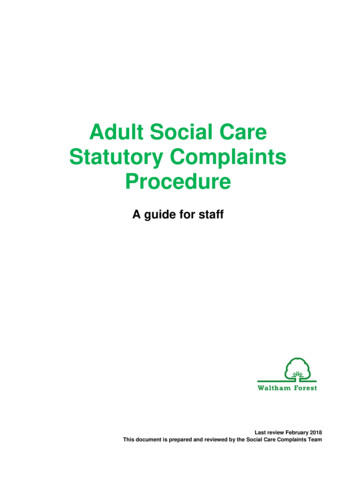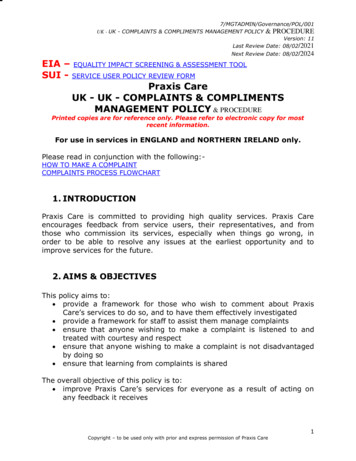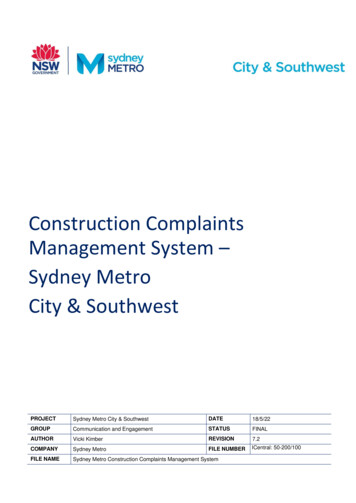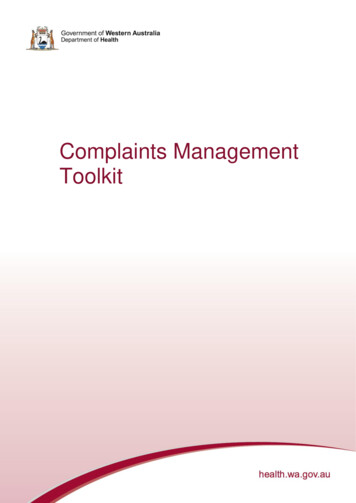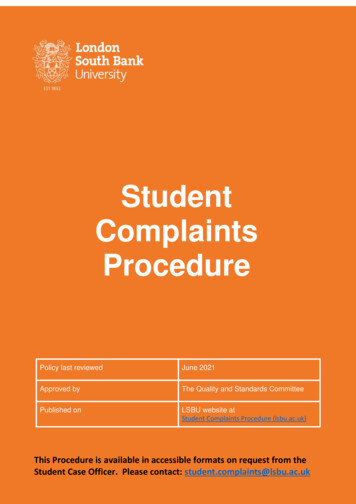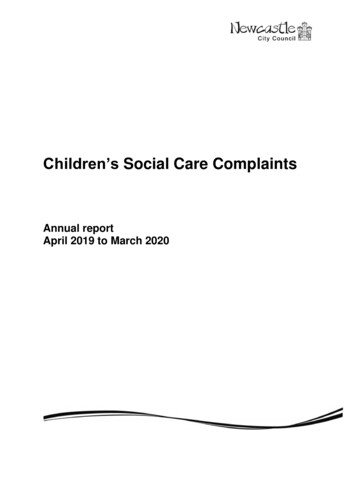
Transcription
Children’s Social Care ComplaintsAnnual reportApril 2019 to March 2020
Contents1.Introduction . 32.Advocacy arrangements . 43.The number of complaints received at each stage . 64.Which customer groups made the complaint? . 65.Statistical data about the complainants . 76.The Type of complaints made . 77.The outcome of the complaints . 88. Compliance with timescales, and complaints resolved within extended timescale asagreed . 99.Complaints considered by the Local Government and Social Care Ombudsman . 1010.The effectiveness of the complaint procedure . 1011.Learning from complaints . 112
1. IntroductionThe Children Act 1989 Representations procedure 2006 is for all representationsreceived from children and young people, their parents, foster carers or otherqualifying adults about social care services provided or commissioned by Children’sSocial Care. The act and regulations set down procedures that councils with socialcare responsibility have to follow when a complaint is made. This is a three stageprocess: Stage 1: local resolutionStage 2: independent investigationStage 3: review panelThis annual report covers all complaints made about Children’s Social Care whichwere received by the Complaints and Customer Relations Team (CCRT) and dealtwith under the statutory complaints procedure for the period 1 April 2019 to 31 March2020.The 2006 social care complaints guidance; “Getting the Best from Complaints” DFES2006 requires that the annual report should be arranged by the Complaints Managerand should provide a mechanism by which the Local Authority can be kept informedabout the operation of its complaints procedure. The report should be presented tostaff, the relevant local authority committee and should be made available to theregulator and the general public. It should provide information about: Details about advocacy services provided under these arrangements; Representations made to the Local Authority; The number of complaints at each stage; Which customer groups made the complaints; Statistical data about complainants; The types of complaints made; The outcome of the complaints; Compliance with timescales, and complaints resolved within extended timescaleas agreed; Complaints that were considered by the Local Government Ombudsman; A review of the effectiveness of the complaints’ procedure. All Local Authoritiesshould provide a system for: the dissemination of learning from complaints to linemanagers; information derived from complaints to contribute to practicedevelopment and commissioning and service planning. Learning and service improvement, including changes to services that have beenimplemented and details of any that have not been implemented3
2. Advocacy arrangementsChildren and young people making a complaint have a legal entitlement to advocacyservices to support them in making a complaint or expressing their views. Newcastlehas a contract in place with the National Youth Advocacy Service (NYAS) to providechildren and young people with this service.The aim of the service is to ensure children and young people have access to anindependent advocacy service, which ensures: They have a say in decisions made about their livesThey are able to share their concerns about their circumstancesThey are listened to and heardThey are treated fairly in the course of their contact with Children’s Social CareThey are supported when pursuing a complaint through every stage of thecomplaints procedure and are provided with information about their rights andoptions, helping them to clarify their complaint and outcomes they are seeking.During this period there were 86 referrals received for an advocacy service forchildren and young people. 3 of these referrals were for an advocacy service wherechildren and young people wanted support to specifically explore making a complaintor had issues with the service provided by the Local Authority or social worker.The majority of referrals were received by on line requests, with the remainder beingmade by phone, e mail or letter as follows:Number601664How referredOn lineBy phoneBy emailBy letterThe majority of referrals for advocacy support were made by social workers;however, it is encouraging that 13 children and young people made referrals directlythemselves.Number461310764Who made the referralSocial workersChildren and young peopleAdvocatesFamily membersCarersIndependent Reviewing OfficersOut of 86 referrals where advocacy services were sought, 44 were for female serviceusers and 42 for male service users indicating that the service has been usedequally for both genders. The age range for children and young people accessingthe advocacy service ranged from 5 years to 22 years; and 9 of these had SpecialEducational Needs or a disability. Their ethnicity is as follows:4
Number6521252117Ethnicity of the service userWhite UKAsian UKBlack UKWhite Eastern EuropeanBlack AfricanBangladeshiKurdishArabUnknownThe reasons for children and young people requesting support from an advocatewere wide ranging, and issues included: Placement issuesPlacement movesPathway plansSupport in Conference or LAC reviewsSupport to make a complaint or resolve dissatisfactionPocket money/personal allowance issuesState benefitsIssues with family membersChild protectionSupport with rights under the Mental Health ActFeedback from children, young people, their carers and professionals about theirexperience of working with an advocate have included the following: A young person reported feeling he had been listened to and was happy with thehelp and support he received. A young person stated that he felt empowered when attending his caseconference; he now feels more confident and doesn’t think they are as scary ashe was expecting them to be. At the end of the piece of work, the young person reported that he did not wantthe advocate to stop working with him but said that he understood she had tohelp other children. A social worker stated the independent advocate had been pivotal in gettingwhere they were today in gaining the young person’s views regarding everythinghe had experienced. Foster carers stated they were pleased with the service provided to children intheir care by NYAS.5
3. The number of complaints received at each stage253 statutory social care complaints were received. These were dealt with at stage1, 2 and 3 of the statutory social care complaints procedure as follows:Stage Number of complaints116722135Total1934. Which customer groups made the complaint?The majority of complaints at all stages were made by parents or grandparents ofchildren receiving a service.Stage 1Who made the complaintService UserRelativeAdvocateFriendMember of %0.6%100Stage 2Who made the complaintRelativeService UserTotalNumber201216Percentage95%5%100
5. Statistical data about the complainantsThere were more females than males that made complaints at Stage 1 and Stage 2.Stage 1GenderMaleFemaleBoth (joint 0Number51621Percentage24%76%100Stage 2GenderMaleFemaleTotal6. The Type of complaints madeComplaints are classified against the following key issues: financial issues;information and communication issues; delay/waiting times; quality of service(multiple issues); and staff practice and behaviour.Stage 1 complaints are increasingly made up of a number of issues. The table belowdetails the categories relating to the key issue of the complaint received at stage 1.Subject matterDelay/waiting timesEligibilityFinancial issuesInformation and communication issuesQuality of service (multiple issues)Staff practice and behaviourTotalNumber1222211327167%11113681610036% of all Stage 1 complaints received and closed in this reporting period wereupheld or partially upheld. Some complaints were withdrawn or referred to otherprocedures or organisation. 50% of Stage 1 and 2 complaints that were investigatedwith an outcome in this reporting period were found to be upheld or partially upheld.This compares to 68% in 2018/19.The greatest proportion of complaints received related to quality of service, whichdescribes complaints where there are multiple issues. Further analysis of thesecomplaints identifies that their main subject(s) matter broadly falls into the followingcategory or categories:7
Subject matterCommunication issue, not receiving updates, minutes or reportsIssues relating to contact arrangementsDisagrees with, or inaccuracies in, reports, care plan or assessmentsFinancial issues or lack of financial supportDisagrees with, or lack of, response, action or supportIssue with specific worker or their attitude/mannerInformation sharing issuesCalls not being returnedOther dissatisfactions with the serviceNumber61613352163451399 of the 113 complaints received relating to quality of service were closed at thetime of reporting. 9 (9%) were upheld and 31 (31%) were partially upheld.a. The subject area with the most complaints was lack of response, action orsupport, cited in 52 complaints.The most common issues in relation to lack of response, action or support werebroken down into the following areas: Lack of action taken in relation to concerns raised about the care ofchildren Perceived lack of help or support provided by the social worker Not being listened tob. Of the 22 complaints relating to information and communication issues, 21 wereclosed at the time of reporting. None were upheld and 8 (38%) were partiallyupheld.The most common issues in relation to communication were: Not being kept up to date about progress and plans for children Lack of contact from the social worker Not receiving letters, reports or minutes of meetings Phone calls or messages not being returned.7. The outcome of the complaintsStage 18
Of the 167 stage 1 complaints received, 141 of these complaints have an outcome inthis reporting period. 31% of all complaints received and closed in this reportingperiod were upheld or partially upheld. 45 were not upheld, and 7 were not able toprove or disprove. 13 were refused, and 25 were withdrawn, referred to otherprocedures or organisations, or incorporated into other complaints.Of the 103 Stage 1 complaints investigated and closed with an outcome at the timeof reporting, 50% were upheld or partially upheld, demonstrating that half of thecomplaints that were investigated had some validity.OutcomeUpheldPartially upheldNot upheldUnable to prove or disproveTotalNumber843457103%842447100Stage 2Of the 21 Stage 2 complaints requested in this period, 2 were closed in this reportingperiod. Of these, neither were upheld or partially upheld, and 2 were withdrawn.OutcomeUpheldPartially upheldRefusedWithdrawnTotalNumber00022%00021008. Compliance with timescales, and complaints resolved within extendedtimescale as agreedIt should be noted that the reported timescales do not take account of the complexityof the complaint, the increasing number of complaints involving court proceedingsnecessitating legal advice or delays agreed with complainants for a more thoroughinvestigation. The complex nature of the complaints made about Children’s SocialCare often need a longer period for a thorough investigation.Stage 1 – Timescales and performanceComplaints should be responded to within 10 working days extended to a maximumof 20 working days.Of the 103 Stage 1 complaints that have have been fully investigated with anoutcome in this reporting period, 30% of complaints have been completed withintimescale.9
Working Days0 – 1011 – 2021 – 3031 TotalNo.Completed12192547103Stage 2 – Timescales and performanceStage 2 Complaints should be responded to within 25 working days extended to amaximum of 65 working days. Of the 21 stage 2 complaints requested in this period,19 were open at the time of reporting. 2 were closed, both were withdrawn.9. Complaints considered by the Local Government and Social CareOmbudsmanThe Local Government and Social Care Ombudsman (LGSCO) has authority toinvestigate when it appears that the Council has not resolved the complaint.Complainants can refer their complaint to the Ombudsman at any time, although theOmbudsman will generally refer all complaints back to the Council, if it has notalready been considered under the complaints procedure. In exceptionalcircumstances however, the Ombudsman will look at things earlier; this is usuallydependent on the vulnerability of the person concerned or if significant delay hasoccurred.The Ombudsman provides a free service; but must use public money carefully. Theymay decide not to start or continue with an investigation if they believe: It is unlikely they would find fault, orIt is unlikely they could add to any previous investigation by the Council, orThey cannot achieve the outcome desiredThe LGSCO investigated 12 complaints in this reporting period. 9 were closed at thetime of reporting and 2 had a finding of fault.10. The effectiveness of the complaint procedureReporting and monitoring systems are continually reviewed to enable a timelyresponse to complaints and compliance with the guidance.In addition to reporting to Directors and Senior Managers, regular reports of all activecomplaints along with timescales are provided to Senior Managers in Children’sSocial Care. These show an overview of all active complaints; and allows for earlyresolution of issues as well as identifying where timescales are not being met.10
At all stages of the complaints procedure, recommendations can be made, or actionsidentified, to ensure that learning is embedded as a result of complaints that havebeen upheld. The implementation of recommendations and actions is monitored toensure that changes occur to improve service delivery. This ensures that theorganisation learns from the feedback and complaints that it receives from the usersof the service.Briefings, information and update sessions are provided as required to ensure thatmembers, staff, foster carers and young people are aware of how to access andrespond to the statutory complaints procedure as well as any recommendations andchanges to practice.The Complaints and Customer Relations Team (CCRT) provide ongoing daily adviceand support to managers around complaints management and resolution; andresponding to representations.As well as overseeing all representations, the CCRT is responsible for themanagement and monitoring of contracts for externally commissioned services forstatutory functions. These are in place and include: Advocacy for children and young people making a complaintIndependent Investigating Officers for Stage 2 complaintsIndependent Persons for Stage 2 complaintsIndependent Review panellists and Independent Review Panel Chairs forStage 3 Review Panels.11. Learning from complaintsComplaints provide invaluable information to identify issues in services and help stafflearning to improve services for the future. Where appropriate, learning isincorporated into training to be delivered to Children’s Social Care staff.Lessons are being learned from complaints and improvements to practice, policy orprocedures implemented.Actions taken as a response to Stage complaints that have been upheld or partiallyupheld fall into three main categories:1. Remedial action to individual complaints2. Improving social work practice and delivering training3. Establishing or changing existing processes, policies or proceduresa. Examples of remedial action for individual complaints Apology to complainants where complaints were upheld or partially upheld11
An apology and acknowledgement was given to a complainant inrecognition of the lack of consistency in information provided in relation toa Special Guardianship payment, and a backdated payment was made. A timetable of contact arrangements was put in place to provide clarity ofarrangements. Discussions took place with the complainant to complete an assessmentand discuss the outcome. Opportunities were provided for a complainant to have a meeting with theIndependent Reviewing Officer.b. Examples of improving social work practice and delivering training Social workers have been reminded of the importance of case recording. Learning from Complaints Briefings have been launched to share with staffkey messages for practice from complaints and identifying service andpractice expectatuons, links to procedures and practice guidance as wellas relevant and available training.Briefings are sent out electronically and stored within TEAMS tostrengthen accessibility; shared within the Social Work Forum, PracticeUpdates and Managers briefings; and shared with Workforce DevelopmentLeads to inform training procurement, delivery and planning. In 2020 the Children’s Social Care Centre of Excellence Steering Groupwill take responsibility for strengthening the ways in which the serviceresponds to learning from complaints. Through the Social Work Forum,ASYE practice and reflection workshops, procured training and e learningfor staff, the Steering Group will ensure that lessons learned fromcpmplaints in more robustly and consistently evidenced in practiceimprovement plans. Complaints training workshops will take place with managers respondingto complaints to support new managers and embed the Managers GoodPractice Guide to responding to complaints.c. Examples of establishing or changing existing processes, policies orprocedures A complainant advised that they were dissatisfied with the response theyreceived to their Stage 1 complaint in relation to the level of contact theyhad had from the investigating manager, and the detail within the writtenresponse. The Principal Social Worker has worked with the ComplaintsLead Specialists to devise and launch a Managers Good Practice Guidefor responding to complaints at Stage 1.12
A complainant raised concerns in relation to the quality of visits by theSupervising Social Worker to their foster carers, anf what was discussedand explored with the carers. This finding was shared with the ServiceManager and Management Team and supported the decision to completean audit of each foster carer’s file to consider the compliance of carers inregular necessary training; and the quality of intervention and supportoffered by the Supervising Social Worker. A complainant raised thet their family had not been clear that whenChildren’s Social Care withdrew, the Family Support Worker (who workedfor Children’s Social Care) would no longer work with their family. Aworking agreement was devised and introduced to Family SupportWorkers across Long Term Teams and the Initial Response Service.Family Support Workers now use this working agreement at the start ofany involvement – the worker sets out the parameters of their role andinvolvement, and clearly identifies to the family that the role andinvolvement of the Family Support Worker will be reviewed by the TeamManager and social worker; and if Children’s Social Care withdraw, theFamily Support Worker will no longer be involved.13
Any queries relating to this report should be sent to:complaintschildrens@newcastle.gov.uk14
253 statutory social care complaints were received. These were dealt with at stage 1, 2 and 3 of the statutory social care complaints procedure as follows: Stage Number of complaints 1 167 2 21 3 5 Total 193 4. Which customer groups made the complaint? The majority of complaints at all stages were made by parents or grandparents of
